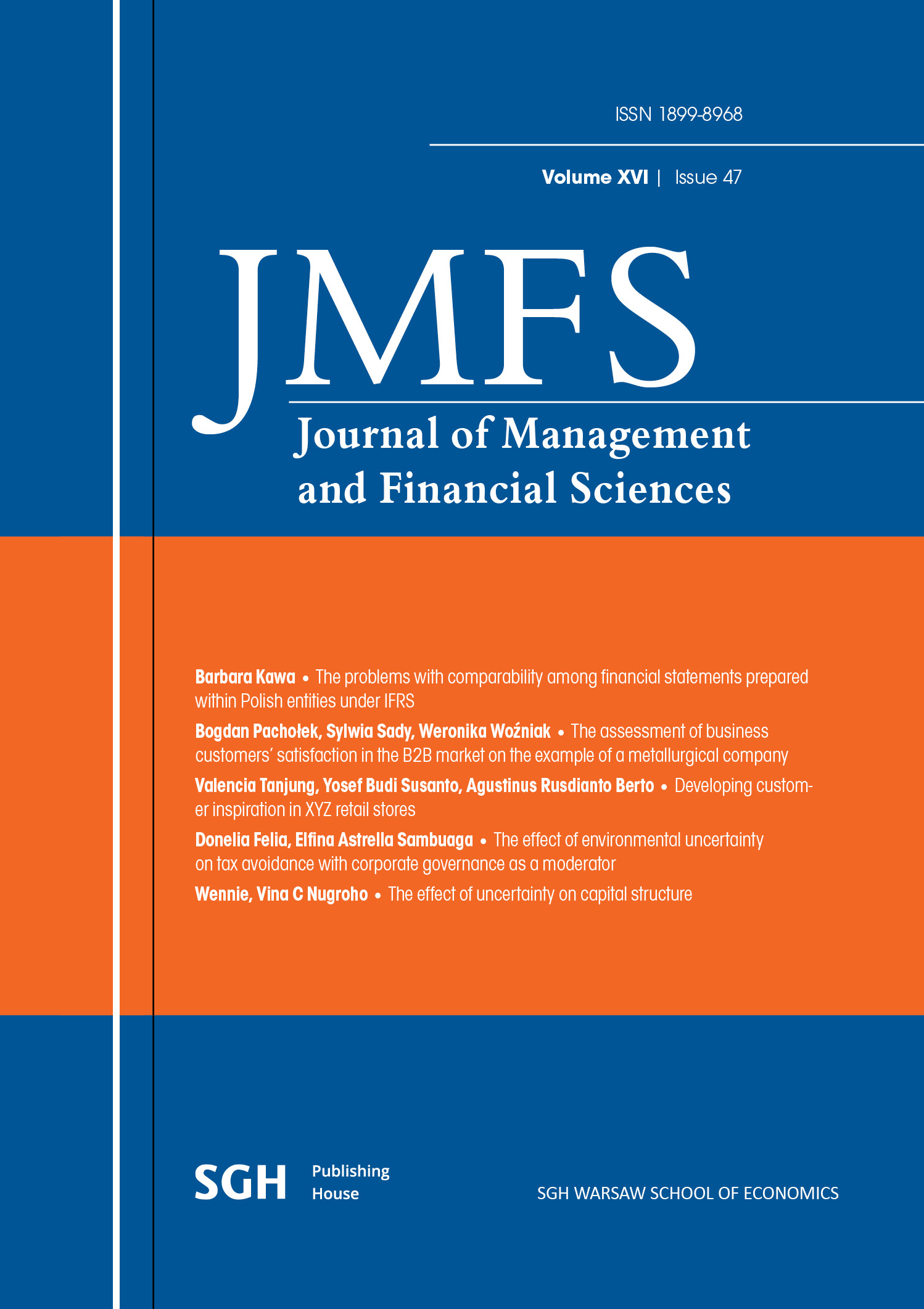The problems with comparability among financial statements prepared within Polish entities under IFRS English
Main Article Content
Abstract
The aim of this paper is to analyse the comparability of headings included in the consolidated statements of profit or loss and other comprehensive income prepared under IFRS.The study required the analysis of statements of profit or loss and other comprehensive income patterns ensured by Polish accounting regulations as well as IFRS propositions in this field. Moreover, it covered the analysis of structure and content of IFRS consolidated statements of profit or lossand other comprehensive income prepared for the 2005–2019 period by Polish listed companies. The empirical study based on 477 consolidated statements of profit or loss and other comprehensiveincome showed that Polish entities use national patterns in IFRS reporting. Moreover, the results indicate that some entities were using the terms proposed by IFRS only in some years.As the analysis showed, there are some factors that may diminish the comparability of financial statements prepared under IFRS. To protect users of financial statements from making wrong decisions based on the illusion of comparable IFRS statements, there is a further obligation for researchon how comparable IFRS financial statements really are. Bringing attention to comparability problems with IFRS financial statements may influence future regulators’ approach in setting standards. This can enhance the quality of financial statements.
Downloads
Article Details
References
2. Aisbitt, S., Nobes, Ch. (2001, Spring), The true and fair view requirement in recent national implementations. Accounting & Business Research, 31(2) (Wolters Kluwer UK).
3. Albu, N., Albu, C.N. (2014). Editorial IFRS application in Central and South-Eastern European countries. Accounting and Management Information Systems, 13(2).
4. Ball, R. (2006). International Financial Reporting Standards (IFRS): pros and cons for investors. Accounting & Business Research, 36, Special Issue (Wolters Kluwer UK).
5. Barth, M.E., Landsman, W.R., Lang, M.H. (2008, June). International Accounting Standards and Accounting Quality. Journal of Accounting Research, 46(3).
6. Cole, V., Branson, J., Breesch, D. (2011). The Illusion of Comparable European IFRS Financial Statements. Beliefs of Auditors, Analysts and Other Users. Accounting and Management Information Systems, 10(2).
7. Crowther, J., Dignen, S., Lea, D. (Managing Eds.) (2002). Oxford University Press Collocations
Dictionary for students of English. Oxford: Oxford University Press.
8. Entities list as of 02.01.2005, 02.01.2006, 02.04.2020, Warsaw Stock Exchange.
9. Fergusson, R., Manser, M., Pickering, D. (Eds.) (2000). The New Penguin Thesaurus. London: Penguin Books.
10. Financial Accounting Standards Board (2010). Statement of Financial Accounting Concepts: Conceptual Framework for Financial Reporting. 8.
11. Gray S.J. (1988, March). Towards a Theory of Cultural Influence on the Development of Accounting Systems Internationally. Abacus.
12. Haller, A., Wehrfritz, M. (2013). The impact of national GAAP and accounting traditions on IFRS policy selection: Evidence from Germany and the UK, Journal of International Accounting, Auditing and Taxation, 22.
13. Hayakawa, S.I. (Ed.) (1981). Cassell’s modern guide to synonyms&related words. London: Cassel.
14. Houqe, N. (2018). A review of the current debate on the determinants and consequences of mandatory IFRS adoption. International Journal of Accounting & Information Management, 26(3).
15. Imhof, M.J., Seavey, S.E., Watanabe, O.V. (2022). Competition, Proprietary, Costs of Financial Reporting, and Financial Statement Comparability. Journal of Accounting, Auditing & Finance, 37(1).
16. Krzywda, D. (2018). Definicje i klasyfikacje kategorii ekonomicznych w badaniach nad współczesnymi zjawiskami finansowymi. Zeszyty Naukowe Uniwersytetu Ekonomicznego w Krakowie, 2(974).
17. Kvaal, E., Nobes, Ch. (2012). IFRS Policy Changes and the Continuation of National Patterns of IFRS Practice. European Accounting Review, 21(2).
18. Łazarowicz, E. (2019). The comparability of IFRS statements of cash flows in Poland. The influence of national regulations. Zeszyty Teoretyczne Rachunkowości, 101(157).
19. Nobes, Ch. (2006). The survival of international differences under IFRS: towards a research agenda. Accounting and Business Research, 36(3).
20. Nobes, Ch. (2011). IFRS Practices and the Persistence of Accounting System Classification. Abacus, 47(3).
21. Shipper, K. (2005). The Introduction of International Accounting Standards in Europe: Implications for International Convergence. European Accounting Review, 14(1).
22. Sinclair, J. (Founding Ed.) (2003). Collins Cobuild Advanced Learner’s English Dictionary. New Edition. Kraków: Express Publishing.
23. Trueblood, R.M. (1966). Accounting principles: the board and its problems. [In:] Empirical Research in Accounting: Selected Studies 1966. The Institute of Professional Accounting, Graduate School of Business. Chicago: The University of Chicago.
24. Zeff, S.A. (2007). Some obstacles to global financial reporting comparability and convergence at a high level of quality. The British Accounting Review, 39.
Legal acts and accounting standards
1. Commission Delegated Regulation (EU) 2019/815 of 17 December 2018 supplementing Directive 2004/109//EC of the European Parliament and of the Council with regard to regulatory technical standards on the specification of a single electronic reporting format (2023). Retrieved from: https://eur-lex.europa.eu/legal-content/EN/TXT/PDF/?uri=CELEX:02019R0815-20230119 [accessed: 17.06.23].
2. Conceptual Framework for Financial Reporting (2018). IFRS Foundation.
3. IAS 1 (2021). Presentation of Financial Statements (Revised 2007). [In:] Commission Regulation (EC) No. 1126/2008 of 3 November 2008 adopting certain international accounting standards in accordance with Regulation (EC) No. 1606/2002 of the European Parliament and of the Council with further amendments. Retrieved from: https://eur-lex.europa.eu/legal-content/EN/TXT/PDF/?uri=CELEX:02008R1126-20230101 [accessed: 26.08.23].
4. The Accounting Act of 29 September 1994, Journal of Laws of 2021 item 217, 2105, 2106. Retrieved from: https://isap.sejm.gov.pl/isap.nsf/download.xsp/WDU19941210591/U/D19940591Lj.pdf [accessed: 09.04.22]
